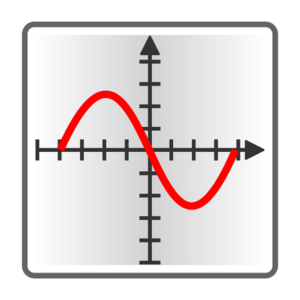Calculus (nonfiction): Difference between revisions
No edit summary |
No edit summary |
||
| (11 intermediate revisions by the same user not shown) | |||
| Line 6: | Line 6: | ||
* '''Integral calculus''' (concerning accumulation of quantities and the areas under and between curves). | * '''Integral calculus''' (concerning accumulation of quantities and the areas under and between curves). | ||
These two branches are related to each other by the fundamental theorem of calculus. | These two branches are related to each other by the [[Fundamental theorem of calculus (nonfiction)|fundamental theorem of calculus]]. | ||
Both branches make use of the fundamental notions of convergence of infinite sequences and infinite series to a well-defined limit. Generally, modern calculus is considered to have been developed in the 17th century by Isaac Newton and Gottfried Leibniz. Today, calculus has widespread uses in science, engineering and economics. | Both branches make use of the fundamental notions of convergence of infinite sequences and infinite series to a well-defined limit. Generally, modern calculus is considered to have been developed in the 17th century by Isaac Newton and Gottfried Leibniz. Today, calculus has widespread uses in science, engineering and economics. | ||
| Line 25: | Line 25: | ||
* [[Crimes against mathematical constants]] | * [[Crimes against mathematical constants]] | ||
* [[Gnomon algorithm]] | * [[Gnomon algorithm]] | ||
* [[Mathematics]] | |||
== Nonfiction cross-reference == | == Nonfiction cross-reference == | ||
* [[Johann Bernoulli (nonfiction)]] | |||
* [[Bhāskara II (nonfiction)]] | |||
* [[Calculus Made Easy (nonfiction)]] - classic textbook on infinitesimal calculus originally published in 1910 by Silvanus P. Thompson. | |||
* [[Fundamental theorem of calculus (nonfiction)]] | |||
* [[Gottfried Wilhelm Leibniz (nonfiction)]] | |||
* [[Leibniz–Newton calculus controversy]] | |||
* [[Isaac Newton (nonfiction)]] | * [[Isaac Newton (nonfiction)]] | ||
* [[Mathematics (nonfiction)]] | * [[Mathematics (nonfiction)]] | ||
* [[Umbral calculus (nonfiction)]] | |||
External links: | External links: | ||
* [https://en.wikipedia.org/wiki/Calculus Calculus] @ Wikipedia | * [https://en.wikipedia.org/wiki/Calculus Calculus] @ Wikipedia | ||
* [https://www.maa.org/press/maa-reviews/a-tour-of-the-calculus A Tour of the Calculus] - Book review | |||
* [https://www.khanacademy.org/math/differential-calculus Differential calculus] @ Khan Academy | |||
* [http://www-math.mit.edu/~djk/calculus_beginners/ Calculus for Beginners and Artists] | |||
* [http://simulation-math.com/GraphingCalculator1/ABGraphingCalculatorDefiniteIntegral.cshtml Fundmental theorem of calculus graphing calculator] | |||
* [https://betterexplained.com/articles/a-gentle-introduction-to-learning-calculus/ A Gentle Introduction To Learning Calculus] - "Here’s my take: Calculus does to algebra what algebra did to arithmetic." | |||
[[Category:Nonfiction (nonfiction)]] | [[Category:Nonfiction (nonfiction)]] | ||
[[Category:Calculus (nonfiction)]] | |||
[[Category:Mathematics (nonfiction)]] | [[Category:Mathematics (nonfiction)]] | ||
Latest revision as of 22:29, 5 February 2019
Calculus (from Latin calculus, literally "small pebble used for counting") is the mathematical study of change.
It has two major branches:
- Differential calculus (concerning rates of change and slopes of curves).
- Integral calculus (concerning accumulation of quantities and the areas under and between curves).
These two branches are related to each other by the fundamental theorem of calculus.
Both branches make use of the fundamental notions of convergence of infinite sequences and infinite series to a well-defined limit. Generally, modern calculus is considered to have been developed in the 17th century by Isaac Newton and Gottfried Leibniz. Today, calculus has widespread uses in science, engineering and economics.
Calculus has historically been called "the calculus of infinitesimals", or "infinitesimal calculus".
Calculus is a part of modern mathematics education. A course in calculus is a gateway to other, more advanced courses in mathematics devoted to the study of functions and limits, broadly called mathematical analysis.
Calculus (plural calculi) is also used for naming some methods of calculation or theories of computation, such as propositional calculus, calculus of variations, lambda calculus, and process calculus.
In the News
Fiction cross-reference
Nonfiction cross-reference
- Johann Bernoulli (nonfiction)
- Bhāskara II (nonfiction)
- Calculus Made Easy (nonfiction) - classic textbook on infinitesimal calculus originally published in 1910 by Silvanus P. Thompson.
- Fundamental theorem of calculus (nonfiction)
- Gottfried Wilhelm Leibniz (nonfiction)
- Leibniz–Newton calculus controversy
- Isaac Newton (nonfiction)
- Mathematics (nonfiction)
- Umbral calculus (nonfiction)
External links:
- Calculus @ Wikipedia
- A Tour of the Calculus - Book review
- Differential calculus @ Khan Academy
- Calculus for Beginners and Artists
- Fundmental theorem of calculus graphing calculator
- A Gentle Introduction To Learning Calculus - "Here’s my take: Calculus does to algebra what algebra did to arithmetic."
